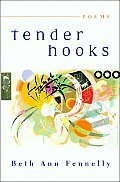2 September 2004 | Vol. 4, No. 3
"Tender Hooks" Refuse to Soften: A Review of Beth Ann Fennelly's Tender Hooks
 Tender Hooks
Tender Hooks
Beth Ann Fennelly
W.W. Norton & Company, 2004
Hardcover, ISBN: 039305862X
Check Amazon.com; check Powell's Books
History's typecast of "the mother" breeds thoughts of the bored housewife, entertaining herself with embroidery, pastel aprons, and flip hairdos. Herstory relates a more honest and complex definition of the mother, much like the work of Beth Ann Fennelly's poems in Tender Hooks. This truth emerges through her surprisingly unique language and humor. She refuses the act of sentimentally sugarcoating with many motifs that challenge this possibility, like pregnancy, miscarriage, labor, and breastfeeding. Many times, this occurs by way of the binary soft/sharp. Even in her opening poem, "Bite Me," Fennelly acknowledges the danger of sappiness with this duality as she addresses her new daughter with the lines, "You who are all clichés of babysoft / crawl to my rocking chair." These first two lines create a striking contrast with the abrupt title. In this same poem, she shows her robust accuracy while appropriately opening the book with a birth.
And Lord did I push, for three more hours
I pushed, I pushed so hard I shat,
pushed so hard blood vessels burst
in my neck and in my chest, pushed so hard
my asshole turned inside-out like a rosebud,
pushed so hard that for weeks to come
the whites of my eyes were red with blood,
my face a boxer's, swollen and bruised,
though I wasn't thinking then
about the weeks to come
Fennelly moves directly from this beginning poem into a collection that explores the role of the real mother. For the author, modern day sub-roles like mother as breast feeder, unmoderated mother, and mother as feminist emerge under the context of the general roles that motherhood encompasses.
In her poem "Latching On, Falling Off," Fennelly focuses on the act of breastfeeding in four parts. These various stages range anywhere from the functional to humorous romantic attempts. In the third section, "After Weaning, My Breasts Resume Their Lives as Glamour Girls," she juxtaposes factory-working wives with her breasts.
So I'm thinking of how,
when World War II had ended,
the factory-worker wives
were fired, sent home
to care for returning soldiers,
when my husband enters the bedroom—
Aren't you glad? He asks, glad,
watching me unwrap bras
tissue-thin and decorative
from the tissue of my old life,
watching, worshipfully, the breasts resettle
as I fasten his red favorite—
Aren't you glad? He's walking
toward them, addressing the, it seems—
but, Darling, they can't answer,
poured back into their old mold,
muffled beneath these lovely laces,
relearning how it feels, seen and not heard.
Much like the wives, Fennelly acclimates to functioning in a progressive sense. Like women initially joining the workforce to fill the places of men and to further women's roles, she joins the breastfeeding force to further the growth of her baby. Both the wives and Fennelly's breasts must transition from their practical role (which surfaces here as more masculine) into their traditional feminine role, to appear physically enticing under "lovely laces" and to be silenced as inferiors for the sake of men and society. For Fennelly, breastfeeding breaches this utilitarian use and enters into the territory of expression, a way for her breasts to play out a dialogue between her and her child.
Another form of silencing exists within her only prose poem "Waiting for the Heart to Moderate," where Fennelly extracts her title Tender Hooks. This occurs at the beginning of the first stanza, as well as the appearance of the poem's main metaphor.
Adults had a drink, they said,

